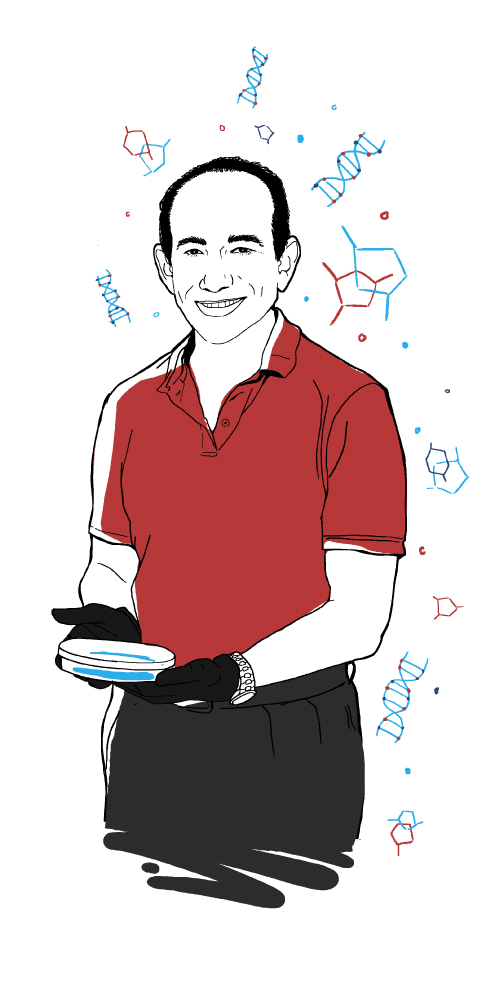I-HEALTH
By Cammi Clark
Gregg Fields, Ph.D., was recently appointed the executive director of the FAU Institute for Human Health and Disease Intervention.
Fields brings a wealth of research leadership, administrative experience and institutional knowledge to the position. He has served as the chair of the FAU Department of Chemistry and Biochemistry in the Charles E. Schmidt College of Science and as director of the Center for Molecular Biology and Biotechnology.
Previously, Fields was director of research and vice president of scientific affairs at the Torrey Pines Institute for Molecular Studies in Port St. Lucie. He will continue on in his role at the CMBB. Fields, who holds seven U.S. patents and authored more than 250 scientific publications, was also named a fellow of the National Academy of Inventors. This distinction is given to academic innovators who have played a key role in creating inventions that have a tangible impact on quality of life, economic development and the welfare of society.
In becoming a Fellow of the National Academy of Inventors, Fields joined an elite group that includes 61 presidents and senior leaders of research universities and nonprofit research institutes and 21 members of the National Inventors Hall of Fame.
His research program has been continuously funded by the National Institutes of Health for 26 years. Fields has also received support from the American Cancer Society, Department of Defense, Florida Department of Health and the Multiple Sclerosis National Research Institute.
Here's what Fields has to say about his research story, new appointment, and the trajectory of the Institute for Human Health and Disease Intervention.

Q & A
Q. Did you always want to be a researcher or did you did you want to be something else? How did you end up here?
A. I always wanted to be a scientist. I had a chemistry set from when I was quite young, back in the day when chemistry sets allowed you to carry out really explosive experiments.
I came to FAU for the opportunity to work at a growing university, collaborate with researchers at The Scripps Research Institute and the Max Planck Florida Institute, and mentor undergraduate students.
Q. What important skills, qualifications or experiences guide your research journey?
A. Like many researchers, my interests were shaped by personal experiences. Unfortunately, my family has an extensive history of cancer afflictions (all four of my grandparents, both of my parents and my sister).
The desire to better understand cancer, and design probes for both diagnosis and therapeutic purposes, has been a driving force in my research.
Q. What are you most proud of in your research/studies/work?
A. Some of our research has resulted in commercial products that address societal needs in diagnosis and treatment. I am also proud of the achievements of former laboratory members, ranging from chief scientific officer at the Center for Disease Detection, San Antonio, Texas, to multiple associate professors.
Q. Talk about the purpose and structure of the new institute, and how you plan to broaden the definition of the clinical and translational research mission.
A. The institute will be structured to capture the strengths of research at FAU. Initially, there will be three focus areas:
• Cancer research and treatment
• Infectious disease diagnosis, therapies and patient awareness
• Neurodegenerative diseases, with initial consideration of Alzheimer’s disease patient care and novel therapeutic approaches.
In addition to the Charles E. Schmidt College of Medicine, the institute will also partner with local hospitals and clinics. For researchers at FAU, the institute will facilitate the translation of basic research by providing access to the experiences of clinicians. In turn, clinical research will benefit from the access to new technologies and insights at the basic research level.
Q. What clinical areas will the institute focus on?
A. Initial targets are improvements in radiation delivery, Alzheimer’s disease patient care and cancer diagnostics.
Q. There has been discussion about FAU partnering with a hospital. How do you envision the institute working with such a partner?
A. A hospital partner is critical to the institute’s goals and ultimate success. Such a partnership will allow for a better understanding of patient needs and, directly relevant to basic research, access to patient data and tissue samples. Working with a hospital partner would also be key to creating a regional cancer center that incorporates basic and applied research and patient care. The Florida Department of Health has shown interest in the development of new cancer centers.
If you would like more information, please contact us at dorcommunications@fau.edu.
Following Fields
Gregg B. Fields, Ph.D., has degrees in chemistry from the University of Florida and Florida State University, and was a postdoctoral scholar with Ken A. Dill, Ph.D., at the University of California at San Francisco.
Fields joined the faculty at the University of Minnesota in 1991 as an assistant professor and was promoted to associate professor with tenure in 1995. In 1997, he achieved the rank of full professor of chemistry and biochemistry.
In 2008, he became a Robert A. Welch Foundation Distinguished University Chair in chemistry in the department of biochemistry at the University of Texas Health Science Center at San Antonio.
He relocated to the Torrey Pines Institute for Molecular Studies in 2011, where he was a full member, vice president of research and distinguished chair of metalloproteinase and multiple sclerosis research.
Fields is also an elected fellow of the National Academy of Inventors and the American Association for the Advancement of Science.
